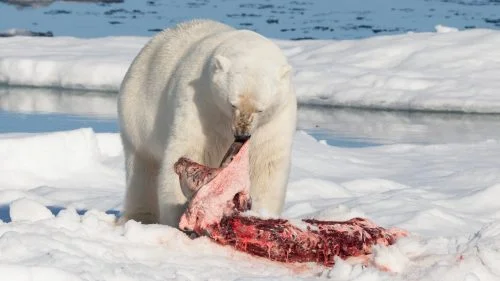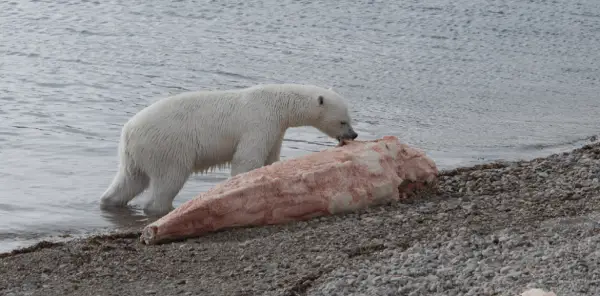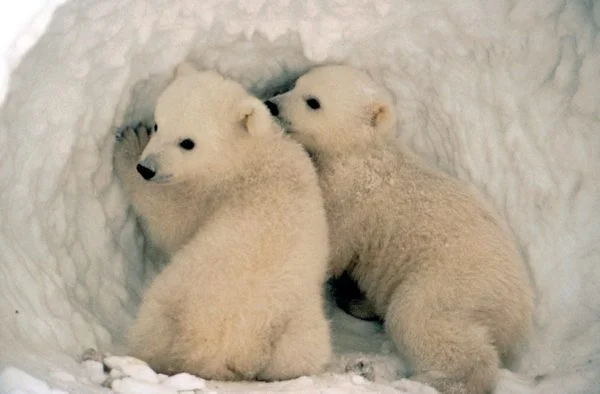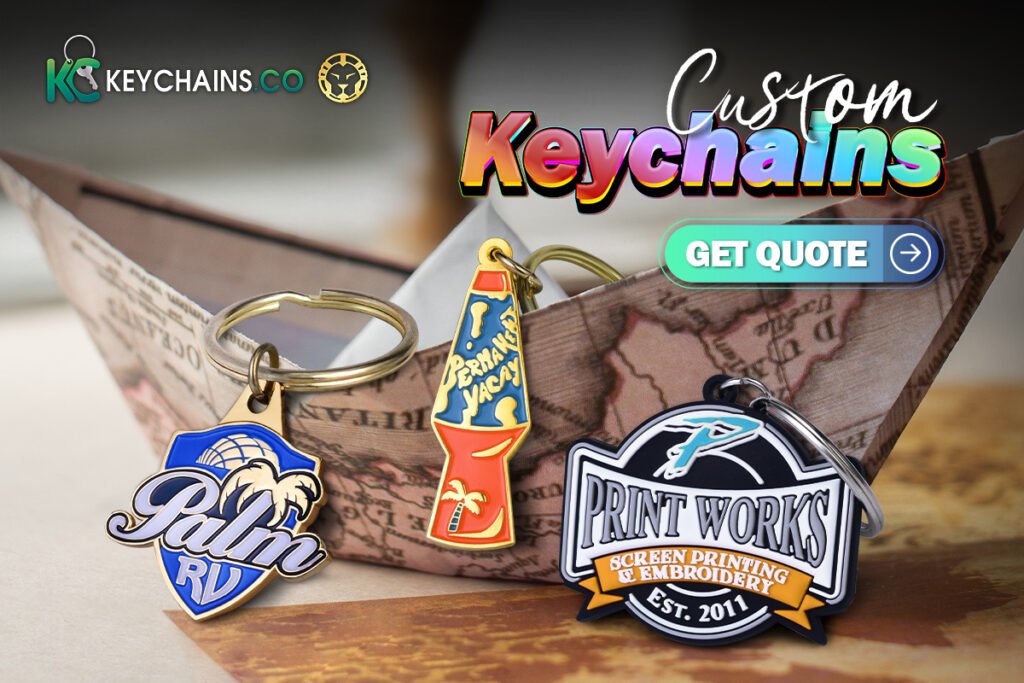Polar bears are the most carnivorous member of the bear species. Other bear species are omnivorous but polar bears’ habitat is devoid of vegetation so their diet mostly consists of meat. They are the powerful and top predators of the arctic region. These gigantic bears are marine mammals and they spend most of their time on Arctic ice sheets. Their adaptations to harsh climate let them move across land, sea, and ice. We have researched and gathered the whole information on “What Do Polar Bears Eat” and list down the menu of Polar Bears Diet.
What Do Polar Bears Eat
- Primarily they eat meat and fats of seals.
- They are opportunistic predators and when their staple diet becomes scarce they may go for other small animals, plants, and even human garbage too.

1. What do Polar Bears Like to Eat
The staple diet of these bears is mostly seal
- The topmost favorite prey of polar bears is a seal.
- Ringed seals
- Bearded seals
- But they also like to have some other type of seals which includes:
- Harp seals
- Hooded seals
- Ribbon seals
- In spring polar bears become the effective predator of seal pups. It has been estimated that these bears kill approximately 44% of newborn seal pups annually.
2, How do Polar Bears Eat
- The favorite part for an adult polar bear in a seal is its skin and the fatty layer beneath it called blubber. They leave the carcass for scavengers like the arctic fox, young polar bears, and ravens.
- Polar bears are surplus killers. It has been reported that polar bears killed two seals at a time while feeding on another seal. The polar bear had killed two seals but neither was eaten.
- Once the polar bear was observed doing still-hunting at a breathing hole. Nearby there was a partly consumed seal, the polar bear also continues still-hunting and stacked three freshly killed seals there.
- Bears on their first kill became full rather they continue to catch, hunt, and stack seals with a lower probability of consuming them later.
3. Do Polar Bears Eat Carcasses
When the polar bears are short of their principal food then they feed on the carcasses. Their strong sense of smell helps them to detect a carcass from almost 20 miles away. They eat the carcasses of some animals which include:
- Reindeer
- Beluga whales
- Grey whales
- Bowhead whales
- Walruses
- Musk ox
- Narwhals

4. Do Polar Bears Eat Beluga Whales
Polar bears kill young walruses and beluga whales occasionally. The polar bear feeds on the carcasses of adult walruses and beluga whales only because they are larger than the polar bears, and they can’t attack them due to their small size.
5. Do Polar Bears Eat Penguins
The polar bear lives in the arctic region (northern hemisphere) whereas the penguin lives in the Antarctic region (South Pole). They don’t even get a chance of seeing penguins in their ecosystem. But when the polar bear’s primary food is scarce and the only available prey is penguins then they will have their paws on it.
You can learn more about Penguins here: Emperor Penguin Facts For Kids
6. Do Polar Bears Eat Arctic Foxes
When they are unable to hunt their regular prey then they go for land mammals too. They may encounter each other while scavenging on the carcass and the powerful bear may kill the arctic fox.
Learn more: Arctic Fox Facts For Kids
7. Do Polar Bears Eat Fish
Fish is not their usual diet. Most arctic fishes are deep down in the water and they are beyond their reach. But in summers they may eat fishes like salmon and cod when they fell short of their staple diet.
8. Do Polar Bears Eat People
Humans are not a part of their diet. But when the humans extend their settlements to the polar bears’ habitat then they might attack them. It has been reported that polar bears attacked a lot of humans in the recent past.
9. What Plants do Polar Bears Eat
- Polar bears feed on vegetation when their food is scarce and they are going through an ice-free season.
- Vegetation in the arctic region is characterized by mini plants. So the polar bear was seen eating:
- Flowering plants
- Shrubs
- Herbs
- Grasses
- Mosses
- lichens
- But the primary forage of polar bear was for:
- Blueberries
- Black crowberries
- The feeding of a polar bear on berries varied yearly from 2 to 41 %, at times when berries are abundant.
10. What do Polar Bears Eat in Summers
Due to climate change, the ice-packed season is getting shorter and the ice-free season is extending. Polar bears don’t get enough time to accumulate the necessary fat reserves to survive at times of food scarcity. The food-free season may last for 3 to 4 months or maybe even longer than that. Here they live off either on their fat reserves to offset the energy loss or they might resort to an alternate which includes:
- Reindeer
- Seabirds
- Small rodents
- waterfowl
- Fish
- crabs
- Shellfish
- Kelp
- Eggs
- Berries
- Human garbage
But the energy contribution of this diet is considered to be very minor to the bear’s energy needs.
11. How Much do Polar Bears Eat
- Polar bears can take a meal of 50-60 kilograms at one time.
- A polar bear can consume blubber of 10 kilograms in 30 minutes.
- Polar bears hunt a single seal in 2-16 days even specifically in a season where seals are abundant. Mostly are the ringed seals.
- It has been estimated that a single polar bear consumes 43 ringed seals yearly.
- The study represented that almost 20000 polar bears will eat 128469 seals annually.
- A seal weighing 121 pounds can provide 8 days of energy for a polar bear.
- Polar bear needs 2 kg (4.4Ib) of fats a day to survive in the harsh icy climate.
- A bear can take in 97%of fats and 84% of the meat it eats.
Have you ever wondered: How Much Do Polar Bears Weigh
12. What do Baby Polar Bears Eat
- Baby polar bears can grow quickly by having their mother’s fatty milk and blubber of seals.
- Baby bear feeds on their mother’s fat-rich milk till the 30th month. The average amount of fat in the female polar bear milk is 33%.
- Baby polar bears start eating solid food by the age of 3 to 4 months. They can’t hunt properly until they are over one year so till that their mothers get them food. Their food is principally seal’s blubber.

13. What do Polar Bears Eat in Captivity
In captivity, polar bears get supplemented with all necessary vitamins like vitamin A, E, D, and calcium and nutrient levels. Their feed encompasses both strategies of carnivores and omnivores at zoos. The food item which they eat in captivity includes:
- Whole chickens
- fish
- Blueberries
- Kelp
- Seasonal fruits
- Animal carcasses
- Cow bones
- Rabbits
- Oxtails
- Pig ears
- Vegetables (carrots, sweet potatoes, turnip)
- Spices and herbs
Vegetables don’t add much to their nutrient level so zookeepers offer them veggies as treats, and carrots for keeping their teeth clean.
14. Do Polar Bears Eat Other Polar Bears
An adult polar bear might attack the polar bear cubs when they lack their principal prey. But an adult polar bear doesn’t eat another adult bear, they are not a part of their diet. They don’t attack an adult bear for eating purposes, but they might get injured by another bear while fighting for mating rights.
15. Do Polar Bears Eat Their Young
The problem of cannibalism (eating your kind) arises among polar bears when they don’t get access to their prey. They will even kill their young members. Polar bears don’t eat the adult members but they do attack the young ones. The increasing trend of this behavior among polar bears is because of:
- The lack of prey
- Global warming is continuously destroying the hunting grounds of these polar bears.
As a rare wild animal, as the ecological environment becomes increasingly severe, the survival of polar bears has attracted increasing attention from humans. And because of its warm appearance, it has been loved by many children and animal lovers. We can’t easily see a real polar bear, but we can express our love and friendliness to it in other ways. For example, customize a polar bear-themed keychain. At KeyChains Co. you are free to design the cutest polar bear you can imagine and create it as a gift. Not only is it a great souvenir and decoration, but it can also be given to friends and partners who also like polar bears.

Learn more:
